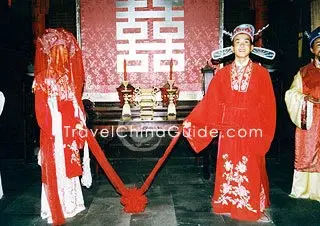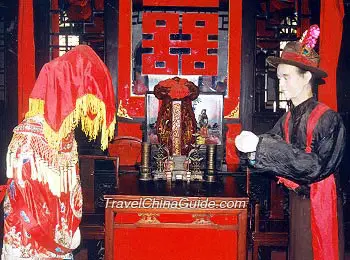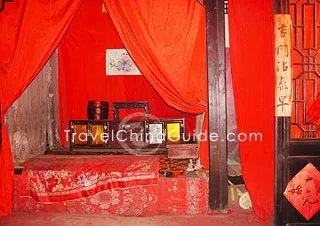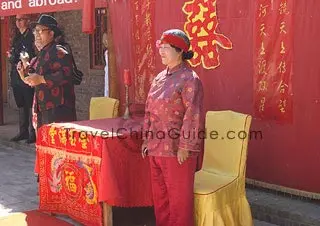Ancient Chinese Marriage Custom
Ever since ancient times, there has been a popular saying in China that the three most delightful moments in one's life come with success in the imperial examination, marriage and the birth of a son. From the Qin (221 BC – 206 BC) to Qing (1644 – 1911) Dynasties, the feudal system dominated over two thousands years. During this period, the importance of getting married was far more than that a person found his better half. For the male side, it determined the prosperity and even the future fame of their family; while for the female side, it meant that parents lost the chance of seeing their daughter for a long time. Thus to choose an ideal partner was vital for both the individual and the family. A set of marriage custom has been passed down and is still in used today.
|
|
Three Letters and Six Etiquettes
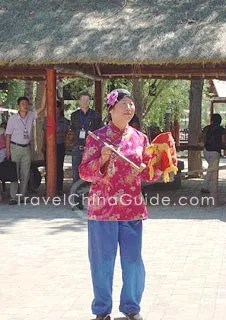 |
| Woman Matchmaker |
Six etiquettes then led to the final wedding ceremony.
![]() Birthday Matching: after knowing the girl's full name and birthday, they would ask a fortune teller to predict whether that could match their son's and whether there would be a happy marriage. The Chinese zodiac would be surely taken into consideration.
Birthday Matching: after knowing the girl's full name and birthday, they would ask a fortune teller to predict whether that could match their son's and whether there would be a happy marriage. The Chinese zodiac would be surely taken into consideration.
![]() Presenting Betrothal Gifts: if the match was predicted to be auspicious, the matchmaker would take gifts to the girl's parents and tell them that the process could continue.
Presenting Betrothal Gifts: if the match was predicted to be auspicious, the matchmaker would take gifts to the girl's parents and tell them that the process could continue.
![]() Presenting Wedding Gifts: This was the grandest etiquette of the whole process of engagement. Prolific gifts were presented again to the girl's family, symbolizing respect and kindness towards the girl's family as well as the capability of providing a good life for the girl.
Presenting Wedding Gifts: This was the grandest etiquette of the whole process of engagement. Prolific gifts were presented again to the girl's family, symbolizing respect and kindness towards the girl's family as well as the capability of providing a good life for the girl.
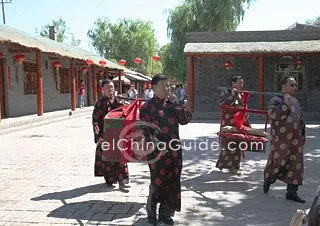 |
| Presenting Wedding Gifts |
![]() Wedding Ceremony: the wedding ceremony began with the groom and his party meeting the bride in her home. Before this day the bride's dowry would have been sent to the boy's house. The dowry represented her social status and wealth, and would be displayed at the boy's house. The most common dowries included scissors like two butterflies never separating, rulers indicating acres of fields, and vases for peace and wealth.
Wedding Ceremony: the wedding ceremony began with the groom and his party meeting the bride in her home. Before this day the bride's dowry would have been sent to the boy's house. The dowry represented her social status and wealth, and would be displayed at the boy's house. The most common dowries included scissors like two butterflies never separating, rulers indicating acres of fields, and vases for peace and wealth.
Before the meeting party's arrival, the bride would be helped by a respectable old woman to tie up her hair with colorful cotton threads. She would wear a red skirt as Chinese believed red foreshadowed delight. When the party arrived, the bride, covered by a red head-kerchief, must cry with her mother to show her reluctance to leave home. She would be led or carried by her elder brother to the sedan. In the meeting party the groom would meet a series of difficulties intentionally set in his path. Only after coping with these could he pass to see his wife-to-be.
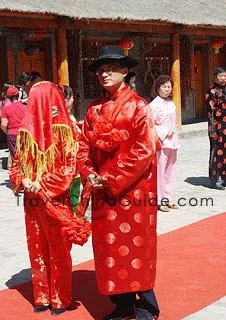 |
| Ancient Chinese Wedding |
On the night of the wedding day, there was a custom in some places for relatives or friends to banter the newlyweds. Though this seemed a little noisy, both of them dropped shyness and got familiar with each other.
On the third day of the marriage, the new couple would go back to the bride's parents' home. They would be received with also a dinner party including relatives.
Of course, marriage customs differed by region, but these were the most common. They have been maintained for thousands of years, but in recent years (especially after the founding of modern China), people have tended to discard some of the details and advocate simplified procedures and wedding ceremonies.![]() Related Readings:
Related Readings: ![]() Chinese Marriage Through a Foreigner's Eyes
Chinese Marriage Through a Foreigner's Eyes![]() Procedures and Requirements of International Marriage Registration in China
Procedures and Requirements of International Marriage Registration in China![]() Share opinions and tips on how to date and marry Chinese in our International Marriage Forum
Share opinions and tips on how to date and marry Chinese in our International Marriage Forum
|
|
